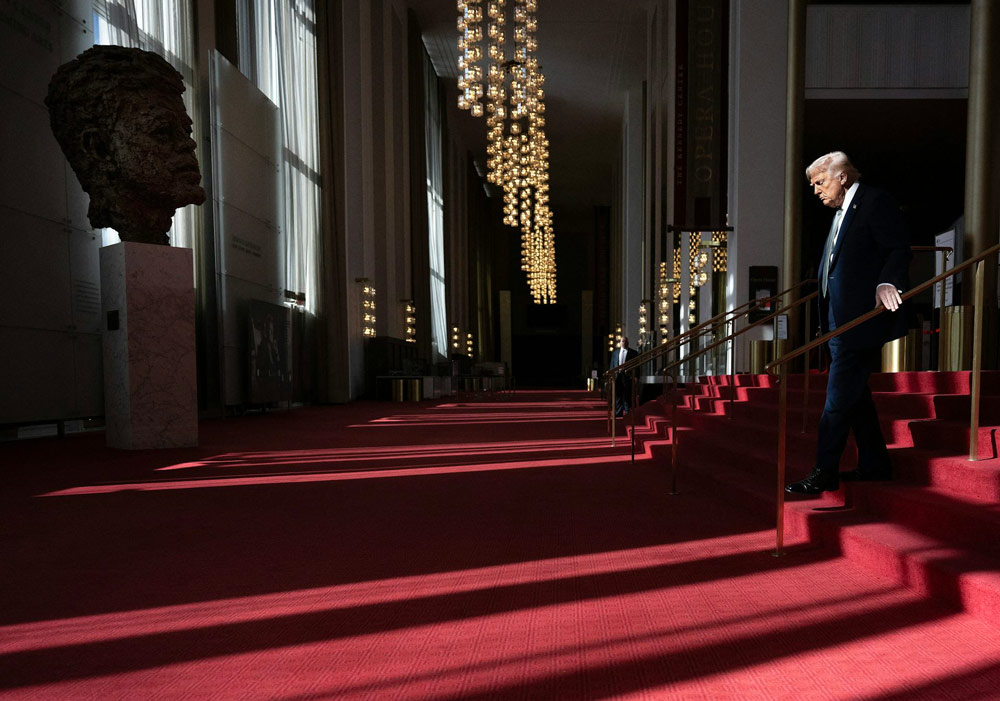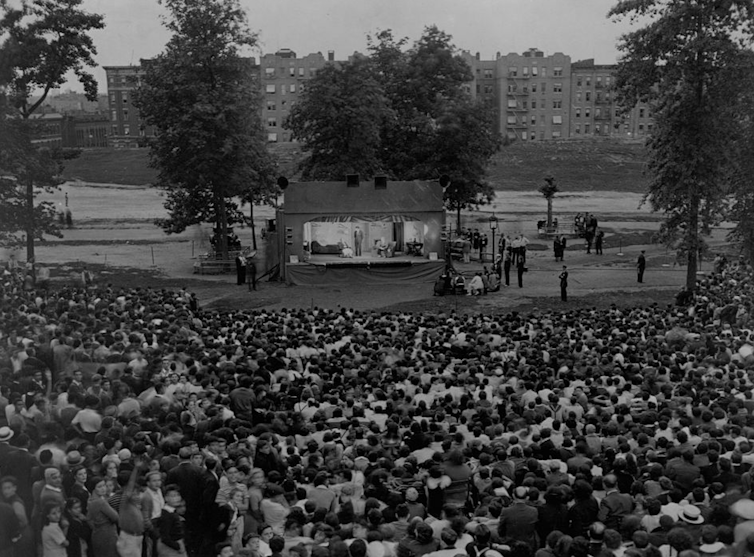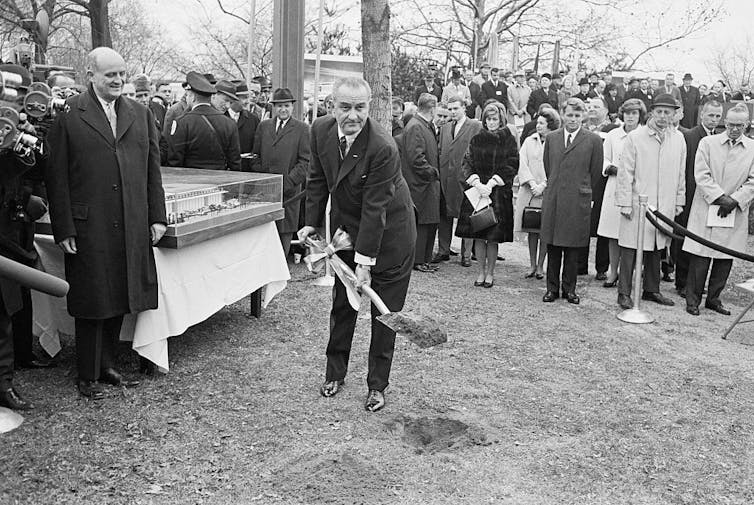
By Joanna Dee Das
When President Donald Trump announced that he was assuming control of the Kennedy Center for the Performing Arts, he described the move as a triumph over “wokey” programming. He subsequently fired the 17 board members appointed by President Joe Biden and installed himself as chairman.
Some critics have reacted to the move by suggesting Trump doesn’t understand art.
One protester declared that Trump has “no artistic bones in his body.” Theater aficionados claim that he misinterprets his favorite musicals, “Cats” and “Les Misérables.”
The New Yorker magazine’s satirical description of the Kennedy Center’s 2025 programming under Trump included a fictional show called “Forbidden Branson.” The title plays on the show “Forbidden Broadway,” replacing New York’s storied theater district with the popular Ozarks tourist destination that has been maligned as a mecca of bad taste.
To me, these responses play right into Trump’s hands, reinforcing his claims that liberals are out-of-touch elitists.
I’ve spent the past seven years researching and writing a book about Branson, Missouri, a town that offers a plethora of live entertainment, including magic shows, country music performances and variety shows. Many of the productions have a conservative, Christian slant. In my view, a Branson-style show could belong among the offerings at the Kennedy Center.
Rather than ridiculing the president’s taste, I think responses to the takeover would be better placed focusing on more fundamental questions about the role of the U.S. government in the nation’s artistic life.
How can a national arts institution best reflect the country’s diverse range of people and interests? Prior to Trump, how well was the Kennedy Center doing at that?
Historical opposition to arts funding
For most of U.S. history, government had a very limited role in the arts.
European royals had long patronized the arts. In contrast, the founders of the United States, fearful of tyranny, created a weak federal government that could barely impose taxes, let alone establish a national theater.
Instead, artists of the 18th and 19th centuries operated in a for-profit marketplace. Their audiences rejected elitist cultural norms and watched Shakespeare mixed in with minstrel songs and comedy acts on the same program.
At the end of the 19th century, the Second Industrial Revolution created a class of ultra-wealthy Americans who sought to imitate European royalty and their tradition of patronage. New cultural distinctions emerged. Opera, ballet and classical music were designated as high art; variety shows featuring comedians, popular songs and acrobatics were designated as low art. Musicals eventually found an uneasy niche as “middlebrow.” Performers who wished to avoid the grind of the commercial marketplace could now turn to private patrons. Nonwhite and working-class performers who lacked social connections to the upper crust had fewer opportunities to do so.
The Great Depression compelled the U.S. government to fund artists for the first time. In 1935, President Franklin D. Roosevelt established Federal Project Number One, which included visual art, theater, music and writing programs. Its primary goal was to provide work for the unemployed. Its secondary purpose involved creating art that would be accessible to ordinary Americans both in terms of location – like murals in public buildings – and content, such as plays like “One Third of a Nation” that spoke to housing concerns.

Dick Rose/Library of Congress/Corbis/VCG via Getty Images
Heated controversies over the program ensued. If the main criterion to receive a grant was need, not skill, would government funding churn out bad art?
Conservative congressmen argued that Federal One artists were taking “unbridled license to ridicule American ideals and to suggest rebellion against our government.” In 1938, the newly formed House Committee on Un-American Activities accused the head of Federal One’s Theatre Project of supporting communism.
Soon thereafter, the Federal One programs ended.
The Cold War and the Kennedy Center
The Cold War created a new opportunity for arts funding as the United States scrambled to counteract the Soviet Union’s depiction of America as “culturally barren.” Under President Dwight D. Eisenhower, the State Department began to sponsor American artists and fund international tours of their work.
Even this modest attempt at public arts patronage – European nations were spending 20 to 40 times as much on the arts – faced pushback from conservatives, who cast the tours as a waste of taxpayer money. Nonetheless, Eisenhower persisted. In 1958, he signed the National Cultural Center Act to authorize a national arts complex.
The act failed to provide enough money to actually build the center. In 1962, President John F. Kennedy embarked on a campaign to raise US$30 million in private money. Part of those fundraising efforts involved reassuring donors that their high-art tastes would be reflected.
The Kennedy Center finally opened its doors in September 1971. Given the need for constant fundraising ever since, philanthropists have dominated its board.
Today, the Kennedy Center receives $43 million as a public subsidy, or 16% of its budget. Ticket sales, facility rentals and donations comprise the other 84%. No government funds go to artistic programming, which has blunted potential criticism about censorship or propaganda. But this has also precluded the ability of regular people across the nation to weigh in about what appears onstage.

Bettmann/Getty Images
An uncertain future
The Kennedy Center staff has attempted to work within the constraints of a philanthropy model to reach a broad audience and challenge high/middle/low distinctions. In its first year, the center appointed renowned choreographer Katherine Dunham as a technical adviser in intercultural communication. She aimed to “make the center more responsible to the community” and establish a model of local engagement in Washington that could be replicated throughout the country.
It didn’t materialize. Programming remained in the traditional high art category until Kennedy Center President Deborah Rutter expanded into genres like hip-hop and comedy in the 2010s. In 2020, the center made progress toward Dunham’s vision with its Social Impact initiative, which focused on free performances and transportation to arts events for local Washington communities. Trump has since dissolved it.
By declaring himself chairman and personally overseeing the programming, Trump has followed in the footsteps of Russian czars or monarchs like Louis XIV of France, who established arts institutions as extensions of royal power. In effect, it realizes 18th-century Americans’ fears about government involvement in the arts as a form of control.
At the same time, the private philanthropy model has been far from perfect. It has left the Kennedy Center vulnerable to attacks of elitism. Perhaps future leaders can imagine more robust models of public support and stewardship that reflect America’s diverse and multifaceted national landscape – if they’re ever given an opportunity to do so.
![]()
Joanna Dee Das is Associate Professor of Dance at Washington University in St. Louis.





























Pogo says
@Joanna Dee Das
Bravo
https://www.google.com/search?q=Joanna+Dee+Das
But beware:
https://en.wikipedia.org/wiki/Hundred_Flowers_Campaign
Marek says
Under no circumstances Trump should be the chairman of this or any other cultural institution.
Deborah Coffey says
A very good history! However, the bottom line to all of this is that Trump just wants to keep adding “stuff” to his kingdom.
Aside from the Kennedy Center there’s Greenland, the Panama Canal, Canada, Gaza, colleges, government institutions across the board, the Fed, all of his enemies, etc. He’s a failure at everything in his life so, all Americans can expect is more failure…BUT failure that will affect every person’s life in the worst way possible. He should be impeached, removed and imprisoned ASAP!
BillC says
Fox News host Tyrus the wrestler as the new Chairman of the Board, “Wrestlemania” and cage fights predominate the schedule. (The art of breaking chairs over elitist’s heads.)
Michael Cocchiola says
I do not think people would reject Kennedy Center programming that would favor conservative tastes were it not for widespread distrust of the Trump cabal’s motives. Are they genuinely interested in making such programming available to the broader public, or are they merely intending to exert control over all facets of public discourse?
At the risk of howls from the right, I’ll bring up Nazi Germany when all “entertainment”, whether music, film, sports, or published material fell under the ministry of propaganda and were used to shape and control information available to the public. Can we risk the same results today if the authors and proponents of Project 2025 gain such control today?
No thanks. Let the MAGAs have their Branson and Grand Ol’ Opry. I’ll take liberal elitism.